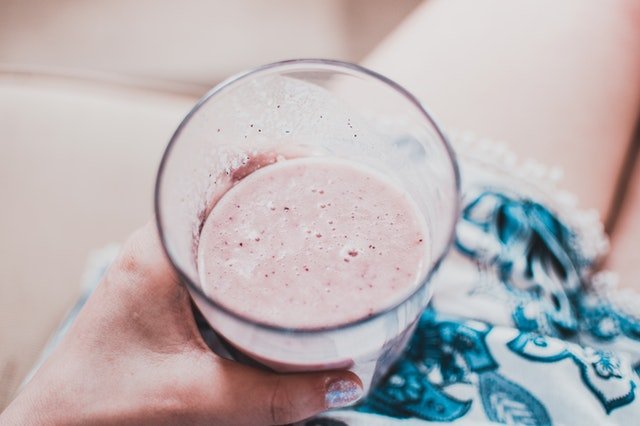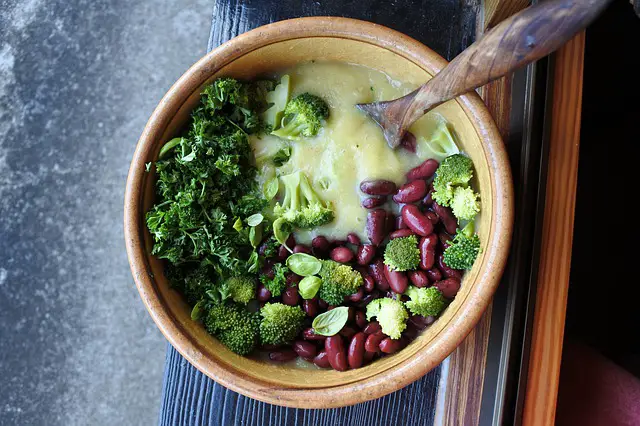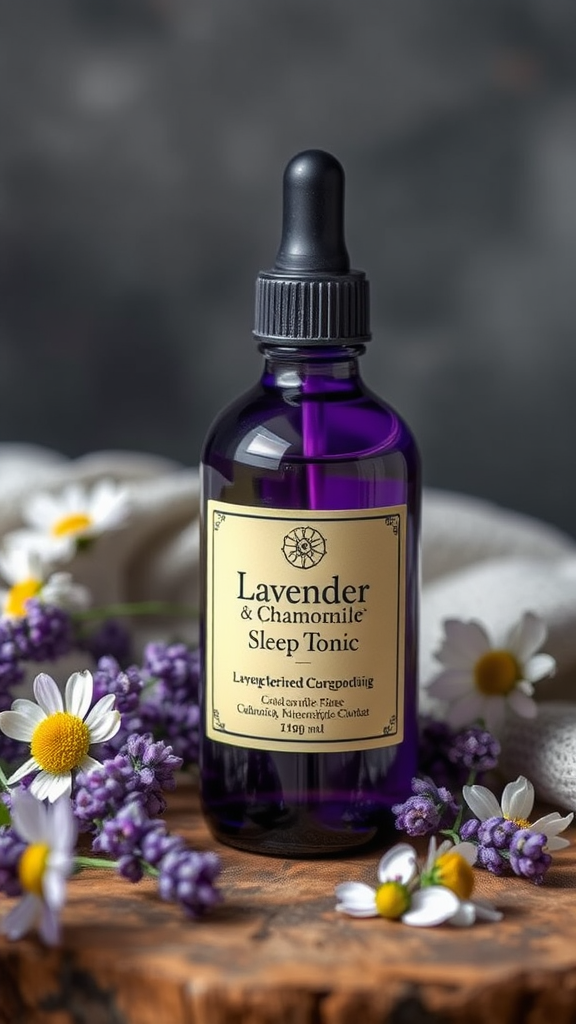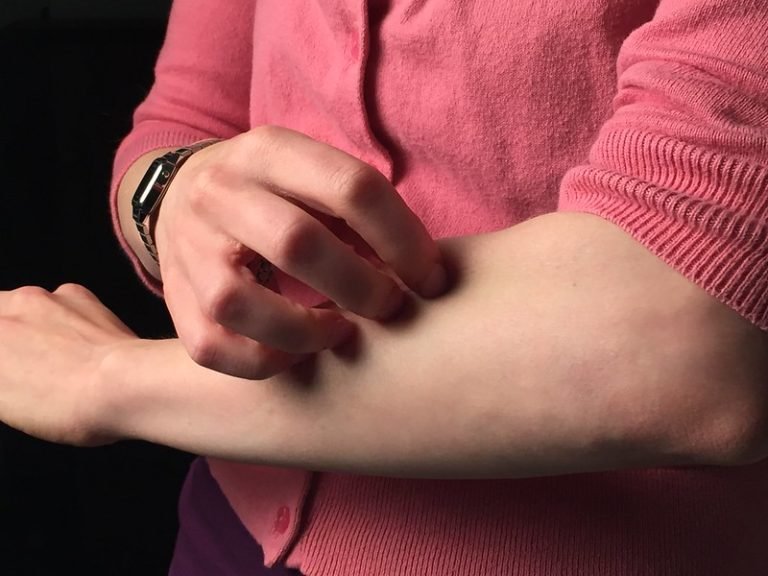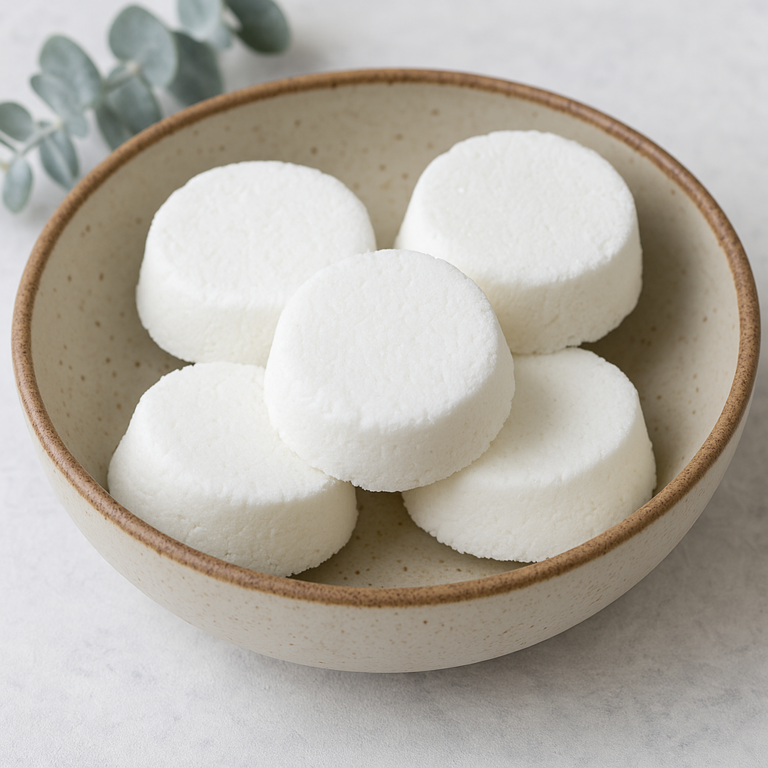Top 10 Vitamin D-Rich Foods for Vegetarian Diets
In today’s fast-paced world, it’s essential to prioritize our health and well-being. One crucial aspect of our well-being is ensuring we get enough vitamins and minerals to support our body’s functions. For vegetarians, getting enough vitamin D can sometimes be a challenge, as it is mainly found in animal-derived sources. However, fear not! In this article, we will explore the top 10 vitamin D-rich foods that are suitable for vegetarian diets, ensuring that you can maintain optimal health while adhering to your preferred dietary choices.
This post contains affiliate links. Read my full disclaimer here.
Why Vitamin D is important on a vegetarian diet?
Vitamin D often takes a backseat in conversations around nutrition, but its significance in our overall well-being cannot be overstated. Sometimes referred to as the “sunshine vitamin,” vitamin D plays a vital role in numerous functions within our body. From promoting calcium absorption for strong bones and teeth to supporting our immune system and neurological functions, vitamin D is truly a superstar nutrient.
Let’s dive deeper into the fascinating world of vitamin D and explore its various roles in our body.
The Role of Vitamin D in Our Body
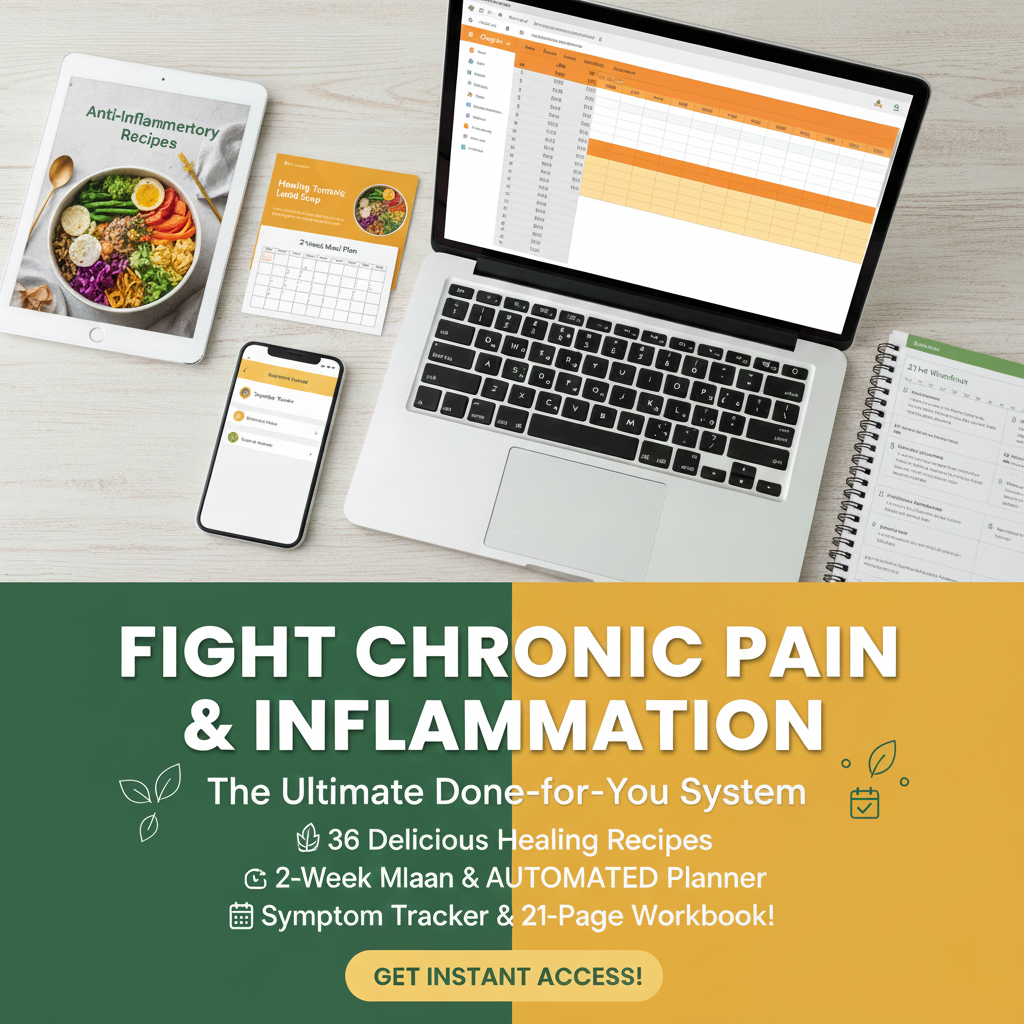
So, just how does vitamin D contribute to our well-being? Firstly, it aids in calcium absorption, ensuring that our bones and teeth stay strong and healthy. Calcium is a key mineral that provides structural support to our skeletal system, and vitamin D helps in its absorption from the food we consume.
But that’s not all! Vitamin D also plays a crucial role in supporting our immune system. It acts as a defense mechanism against various diseases and infections by regulating the activity of immune cells. Studies have shown that individuals with adequate levels of vitamin D are less likely to fall ill or experience severe symptoms when faced with common infections.
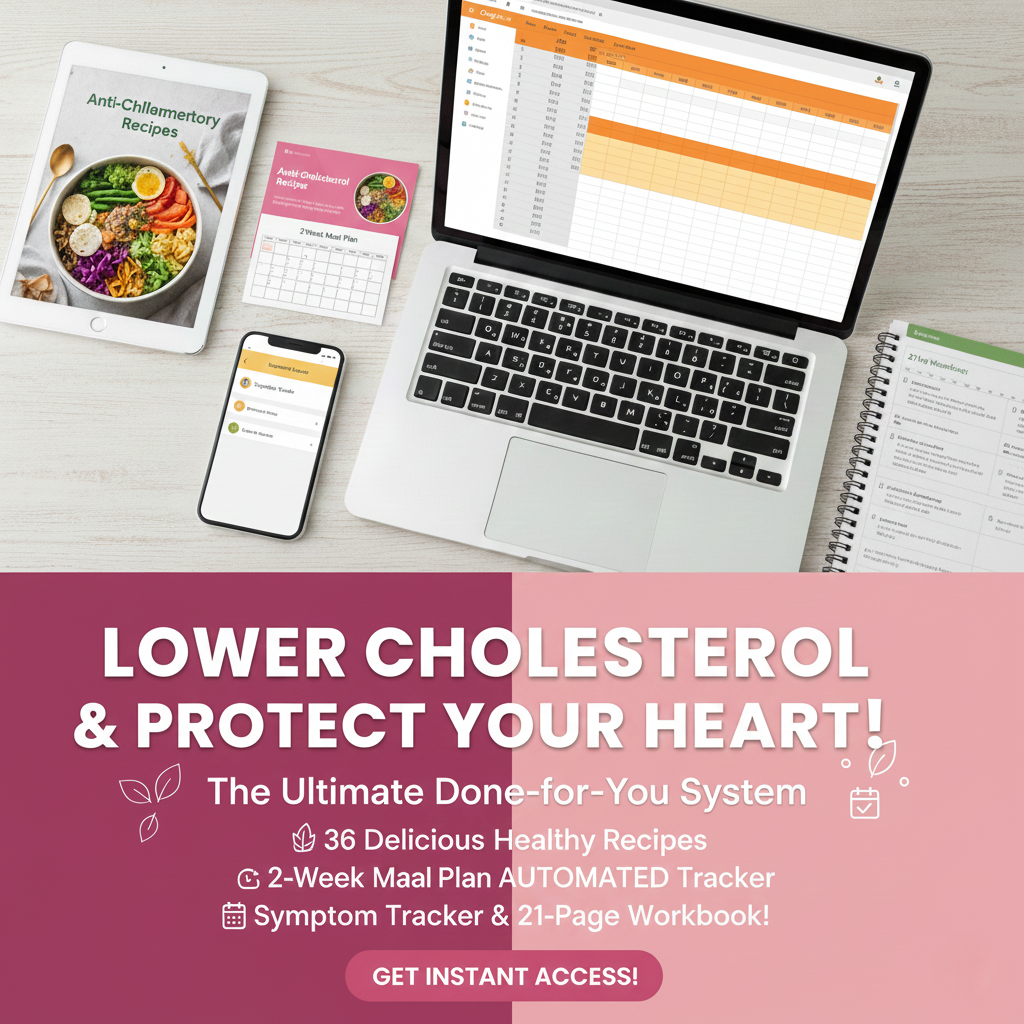
Moreover, vitamin D is involved in cellular growth and differentiation, making it crucial for the development and maintenance of healthy cells. It helps in the regulation of genes that control cell division, ensuring that our body can produce new cells as needed and maintain the integrity of existing ones.
Interestingly, vitamin D receptors are found in various organs and tissues throughout our body, indicating its wide-ranging effects. These receptors enable vitamin D to exert its influence on different systems, including the cardiovascular, respiratory, and musculoskeletal systems.
Vitamin D Deficiency: Causes and Symptoms
Unfortunately, many individuals, including vegetarians, suffer from vitamin D deficiency. This deficiency can stem from various causes, such as limited sun exposure, a lack of vitamin D in the diet, or certain health conditions that impair absorption.
One of the primary sources of vitamin D is sunlight. When our skin is exposed to sunlight, it synthesizes vitamin D with the help of a compound called 7-dehydrocholesterol. However, factors such as living in regions with limited sunlight, spending most of our time indoors, or using excessive sunscreen can hinder this natural process and lead to insufficient vitamin D levels.
In addition to limited sun exposure, a lack of vitamin D in the diet can contribute to deficiency. While some foods, such as fatty fish, egg yolks, and fortified dairy products, contain small amounts of vitamin D, it can be challenging to meet the recommended daily intake through diet alone.
The search for reliable, affordable supplements doesn’t have to be complicated. Fuel your vitality with Swanson – pure, affordable nutrition for all.
Here are ten potential symptoms of vitamin D deficiency:
- Fatigue:
- Feeling constantly tired and lacking energy can be a sign of vitamin D deficiency.
- Bone and Back Pain:
- Vitamin D plays a crucial role in calcium absorption, and its deficiency may lead to bone and back pain.
- Depression:
- There’s a link between low vitamin D levels and mood disorders, including depression.
- Impaired Wound Healing:
- Vitamin D is essential for the production of antimicrobial proteins that assist in fighting off infections. Slow wound healing may indicate deficiency.
- Muscle Pain:
- Vitamin D is involved in muscle function, and its deficiency can lead to muscle pain and weakness.
- Hair Loss:
- Although more research is needed, some studies suggest a connection between hair loss and insufficient levels of vitamin D.
- Frequent Illness or Infections:
- Vitamin D is known to enhance the pathogen-fighting effects of monocytes and macrophages. Low levels may result in an increased susceptibility to illnesses.
- Bone Loss:
- Severe deficiency can lead to a softening of the bones, known as osteomalacia in adults and rickets in children.
- Difficulty Concentrating:
- Some studies suggest that there might be a link between vitamin D deficiency and difficulties in concentration and cognitive function.
- High Blood Pressure:
- There’s evidence suggesting that insufficient vitamin D levels may contribute to high blood pressure.
The Challenge of Getting Vitamin D in a Vegetarian Diet
While plant-based foods undoubtedly offer numerous health benefits, vitamin D-rich options can be limited. Unlike animal products, plant-based foods are generally poor sources of vitamin D. The few plant sources that do contain vitamin D include mushrooms, fortified plant-based milks, certain cereals, and more.
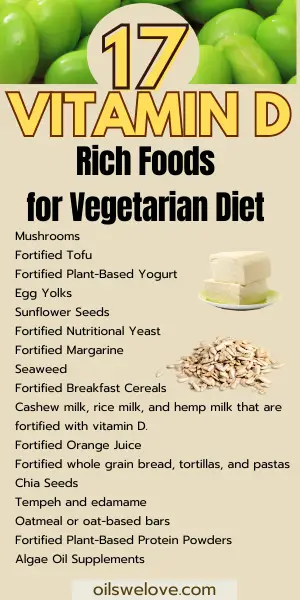
Top 10 Vitamin D-Rich Foods for Vegetarians
1. Fortified Dairy Alternatives
To ensure an adequate intake of vitamin D, consider incorporating fortified dairy alternatives into your diet. Fortified soy, almond, or other plant-based milks can provide essential nutrients, including vitamin D. Be sure to check the labels and choose products that are fortified with vitamin D.
2. Mushrooms: A Unique Source of Vitamin D
Mushrooms are one of the few natural plant-based sources of vitamin D. When exposed to sunlight or UV light during growth, mushrooms produce vitamin D, making them a valuable addition to vegetarian diets. Including a variety of mushrooms, such as shiitake, maitake, or portobello, can boost your vitamin D intake.
3. Fortified Orange Juice and Other Fruit Juices
Start your day off right with a glass of vitamin D-fortified orange juice. Look for brands that have added vitamin D to provide an extra nutrient boost. Additionally, some fruit juices, like fortified apple juice or grapefruit juice, can contribute to your vitamin D intake. A refreshing way to nourish your body!
4. Vitamin D-Rich Cereals and Oats
Breakfast is the perfect opportunity to incorporate vitamin D-rich cereals and oats into your vegetarian diet. Many brands fortify their cereal products with vitamin D, making them an appealing and easy way to increase your vitamin D intake. Enjoy a bowl of your favorite fortified cereal with some plant-based milk for a nutritious start to your day.
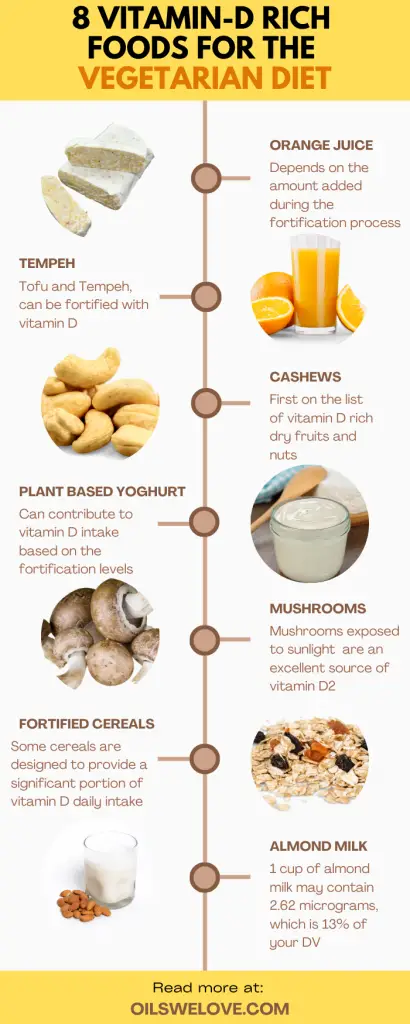
5. Certain Types of Tofu and Tempeh
Tofu and tempeh are staple ingredients in vegetarian diets, and some varieties can provide you with a healthy dose of vitamin D. When shopping for tofu or tempeh, opt for those that have been fortified with vitamin D to help meet your dietary needs.
6. Almond Milk and Soy Milk
Almond milk and soy milk are not only delicious dairy alternatives, but they can also offer a significant amount of vitamin D when fortified. Enjoy a cold glass as a refreshing drink or use them in your favorite recipes to boost your vitamin D levels naturally.
7. Certain Types of Cheese
If you include dairy products in your vegetarian diet, certain types of cheese can contribute to your vitamin D intake. Swiss cheese, for example, is known to contain higher levels of vitamin D compared to other varieties. Remember to savor cheese in moderation, as it can be high in saturated fat.
8. Egg Yolks
While not strictly vegetarian, eggs are a good source of vitamin D. If you’re an ovo-vegetarian, incorporating eggs into your diet can be beneficial.
9. Fortified Bread and Pasta
When looking for vitamin D-rich sources, don’t forget about fortified bread and pasta options. Some brands enrich their products with vitamin D, allowing you to incorporate this essential nutrient into your meals with ease. Enjoy a delicious pasta dish or a nutritious sandwich knowing you’re boosting your vitamin D intake.
10. Fortified Margarine
Some plant-based margarines are fortified with vitamin D. Check the product labels for details.
In conclusion, maintaining a balanced and healthy vegetarian diet is not without its challenges, but obtaining adequate amounts of vitamin D is certainly achievable. By incorporating these top 10 vitamin D-rich foods into your vegetarian lifestyle, you can ensure you’re meeting your nutritional needs while embracing the benefits of a plant-based diet. So, go forth and nourish your body with these delicious, nutritious options, knowing that you’re supporting your overall well-being and vitality!


